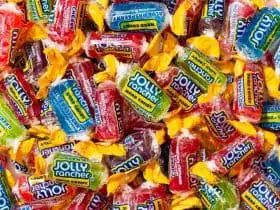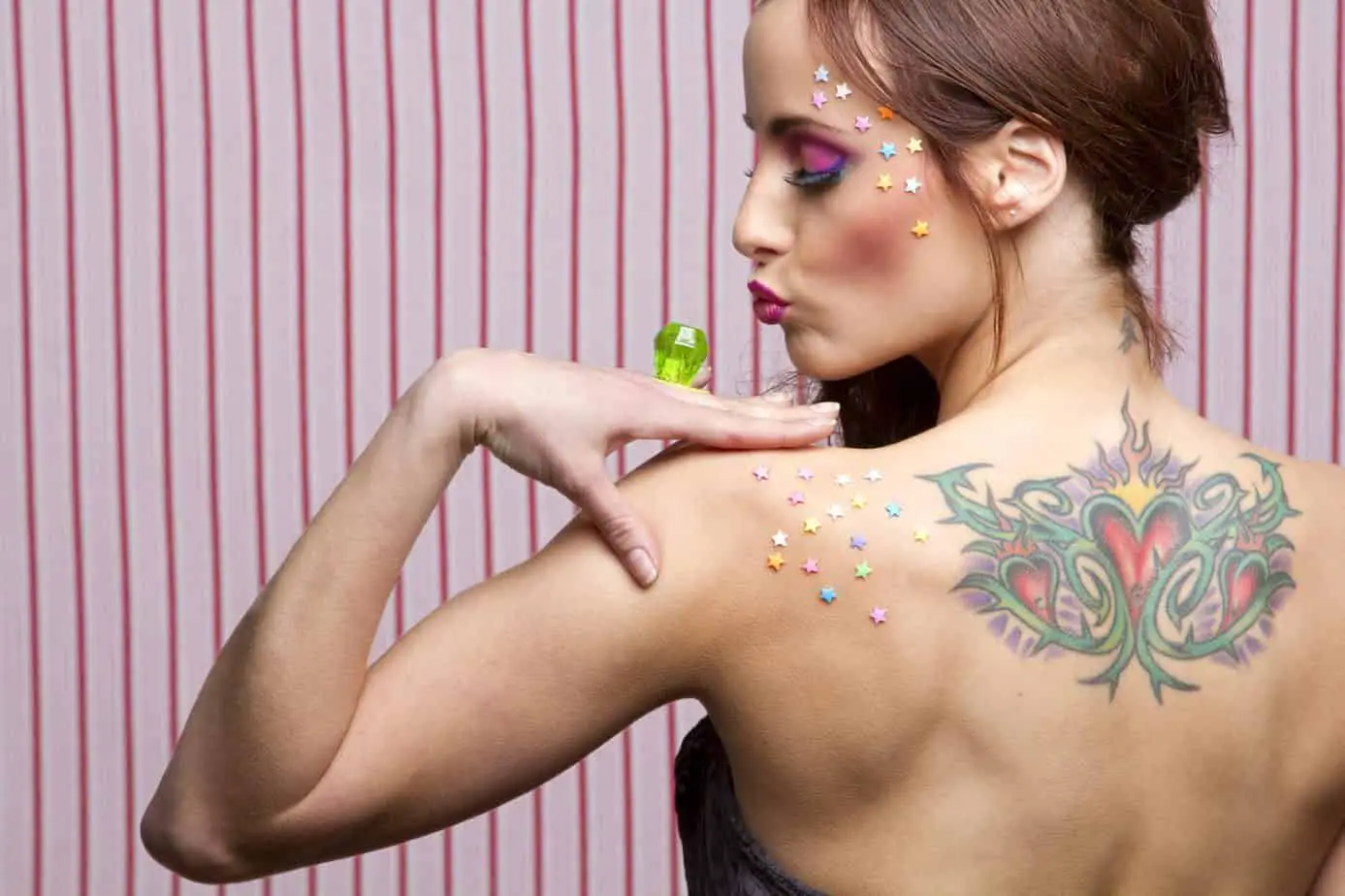This popular variety of fruit flavored lollipop comes in the shape of a wearable plastic ring that contains edible hard candy in the shape of jewels. A delight for children, this candy makes sure the sweet teeth of foodie disney princesses are satisfied. Although many other brands produce similar designs of lollipops, none of them compares to Ring Pops with its huge fan following of little jewel lovers.
Ring Pops may be the absolute favorite of your child, but are Ring Pops vegan? Unlike most such attractive candies, Ring Pops are vegan.
The ingredients in different flavors may be widely varied but basically they are all combinations of corn syrup, sugar, lactic acid, fruit juice concentrate, artificial food colorants, and natural and artificial flavors.
The original Ring Pops do not contain any groundbreaking non-vegan ingredients. But this is not true for the new variable varieties. Have a look at every discussion around the original Ring Pops and their new varieties.
Prices pulled from the Amazon Product Advertising API on:
Product prices and availability are accurate as of the date/time indicated and are subject to change. Any price and availability information displayed on [relevant Amazon Site(s), as applicable] at the time of purchase will apply to the purchase of this product.
Contrary to popular belief, the original Ring Pops do not contain gelatin or egg albumin
It is common to find gelatin or even egg albumin listed as an ingredient in fruity candies and lollipops. If you aren’t aware, gelatin is a substance made by boiling animals bones, tendons, and ligaments in water until a transparent, odourless, and tasteless substance is attained which can be used to impart a chewy texture to candies.
Gelatin is present in many popular candies like Starburst. Egg Albumin refers to the proteinaceous portion of the egg that works as a binding agent and aerator in mixtures.
Both gelatin and egg albumin are used in candies to render them a uniform consistency and candy texture. It is common and natural for vegans to scrutinize every product thoroughly. But the assumption of the presence of gelatin or egg albumin in Ring Pops is wrong.
Ring Pops don’t contain gelatin or egg albumin.
Foods are not rendered non-vegan by the presence of sugar
Sugar is inevitably present in all candies and almost all other foods. It is impractical to expect every product to be sugar-free when the whole human population isn’t diabetic.
Almost every other specially formulated vegan product or alternative also contains sugar. Ring Pops are but a candy for kids.
The debate around sugar in veganism arises from the fact that a large amount of sugar in North America is filtered in factories using bone char. Bone char is made by burning bones of dead animals at high temperatures in combustion chambers. Although the bones of only dead animals are used for this purpose, many vegans consider it an animal-based ingredient used in the production of sugar.
As a matter of fact, bone char is not passed as a remnant into the bleached sugar. It is only the part of an intermediate process in the production of sugar.
Because no animals are actively killed for the production of bone char, it is unfair to call it a non-vegan product, rightly so, because we never come in contact with it. It is an animal-based product and its use should be reduced but it doesn’t explain so many people discontinuing the consumption of sugar altogether.
Partly because all sugar is not necessarily filtered with bone char. The sugar is your share of Ring Pops might never have been whitened by this process. A large amount of sugar in America is also filtered using granular activated carbon.
This substance is not acquired from animals and functions as effectively as bone char is bleaching sugar. Naturally white beetroot and coconut-based sugars are also widely popular in the American market.
The important point is, you never know whether the sugar in your Ring Pops or any other food item has ever been filtered by bone char or not.
Veganism does not imply avoiding ingredients that are not non-vegan indeed.
The artificial food dyes in Ring Pops may be worth your attention

Even though food colorants are natural to colorful candies, it doesn’t imply that they are right. Some of the so called vegan food colorants have far reaching consequences when it comes to animal-cruelty.
One of the most common food colorants in candies are Red 40 and Red 4. Twisted Berry Blast, Raspberry, Cherry, Strawberry, Watermelon, and Strawberry Lemonade flavors of Ring Pops contain red food coloring agents.
The notorious Red 4 is a natural dye derived from crushed insects like beetles. Also known as Carmine, this pigment contains a compound called carminic acid which renders it the bright red appearance. The production process of ths coloring agent further involves the use of gelatin, fish glue, and egg white.
Thankfully, this is not the red dye present in Ring Pops. The Cherry variety of Ring Pops contains Red 40, also known as Allura Red, derived from strawberries and petroleum.
Red 3 is another azo dye present in Strawberry, Twisted Berry Blast, Twisted Citrus Craze, and Twisted Raspberry Lemonade flavors.
Other food dyes used in Ring pops are Yellow5, Yellow 6, and Blue 1. Yellow 5 and 6 are derived from petroleum while Blue 1 is made synthetically in laboratories.
All these apparent vegan food coloring agents are tested on animals in laboratories to evaluate their safety of use in humans. Poor animals die of adverse effects in these labs. The ones that survive are denied treatment and killed to be disposed of. Such blatant animal-cruelty should not be prevailing in today’s time when more and more people are adopting a vegan lifestyle.
There are no non-vegan shiny coatings in Ring Pops
It is common for manufacturers to make their products look more attractive by using shiny surface coating and glazes. That lovely gloss finish is often attained with the help of beeswax or confectioner’s glaze.
Beeswax is non-vegan as it is derived from bee hives. Bees do not work so hard for their products to be stolen by us in the end. This is a widely prevalent form of animal exploitation. A large number of bees are killed in the process of obtaining their produce.
The artificial rearing of bees has caused immense problems in the survival of bees in our ecosystem. Bees are an integral part of the earth’s ecosystem and their decline could result in the fall of our total balance. The industries that exploit bees also put their populations in danger.
Bees have to keep migrating to new hives and they are treated like unethical bonded laborers by humans. New forgien varieties of bees bring new diseases to the native species and further decline their numbers. The narrowing of the gene pool of bees has enhanced the occurrence of rare diseases in bee populations.
Despite many vegans not conforming to the non-vegan status of products derived from bees, beeswax and honey remain animal-derived substances and they are products of animal-cruelty.
Confectioner’s glaze is obtained from a lac insect. Trust me, you do not want particles of insects in your food. Confectioner’s glaze is not vegan.
Ring Pops contain lactic acid, here’s what you should know
Lactic acid is not the same as lactose. Lactose is essentially milk sugar but lactic acid is not necessarily obtained from milk.
Most manufacturers obtain lactic acid from lactic acid producing bacteria or by chemical synthesis of lactic acid through petroleum. It is natural for vegans to harbor doubts when it comes to food. It is our responsibility to clear the air.
Some new varieties of Ring Pops may not be vegan
The more recent variety of Ring Pops called Ring Pop Gummies may not be vegan. This chewy variety of candy contains gelatin. As gelatin is a straightforward non-vegan ingredient, it isn’t safe for vegans to consume this product.
Consider these alternatives if Ring Pops do not sound vegan to you
Be it the presence of artificial food coloring agents, natural flavors, lactic acid, or sugar. If any ingredient in Ring Pops does not conform to your standards of veganism, be free to choose the perfect vegan alternatives.
YumEarth
A range of completely vegan and delicious sucker candies are produced by YumEarth. If you have blacklisted Ring Pops because of the presence of artificial food colorants, YumEarth is just the brand of sucker candies for you.
The best part about YumEarth is their promise and dedication in using plant-based food dyes that don’t need to be tested on animals. The dyes are predominantly derived from black carrots and pumpkins. Your children are sure to go gaga over these vegan lollipops.
- Free From Top 8 Allergens: Great treat for everyone! Perfect for class parties, school snacks and lunch snacks
Prices pulled from the Amazon Product Advertising API on:
Product prices and availability are accurate as of the date/time indicated and are subject to change. Any price and availability information displayed on [relevant Amazon Site(s), as applicable] at the time of purchase will apply to the purchase of this product.
GoOrganic
The pomegranate and Blood Orange flavors produced by GoOrganic are a favorite amongst vegans. This hard sucker candy is the way to go if you are dissatisfied with the ingredients in Ring Pops.
Prices pulled from the Amazon Product Advertising API on:
Product prices and availability are accurate as of the date/time indicated and are subject to change. Any price and availability information displayed on [relevant Amazon Site(s), as applicable] at the time of purchase will apply to the purchase of this product.
Are Ring Pops vegan?
The answer depends upon how strict you are as a vegan. If you don’t consume sugar, artificial food colorants, natural flavors, or lactic acid, Ring Pops are not the candy for you. You must go for other more vegan alternatives.












Leave a Reply